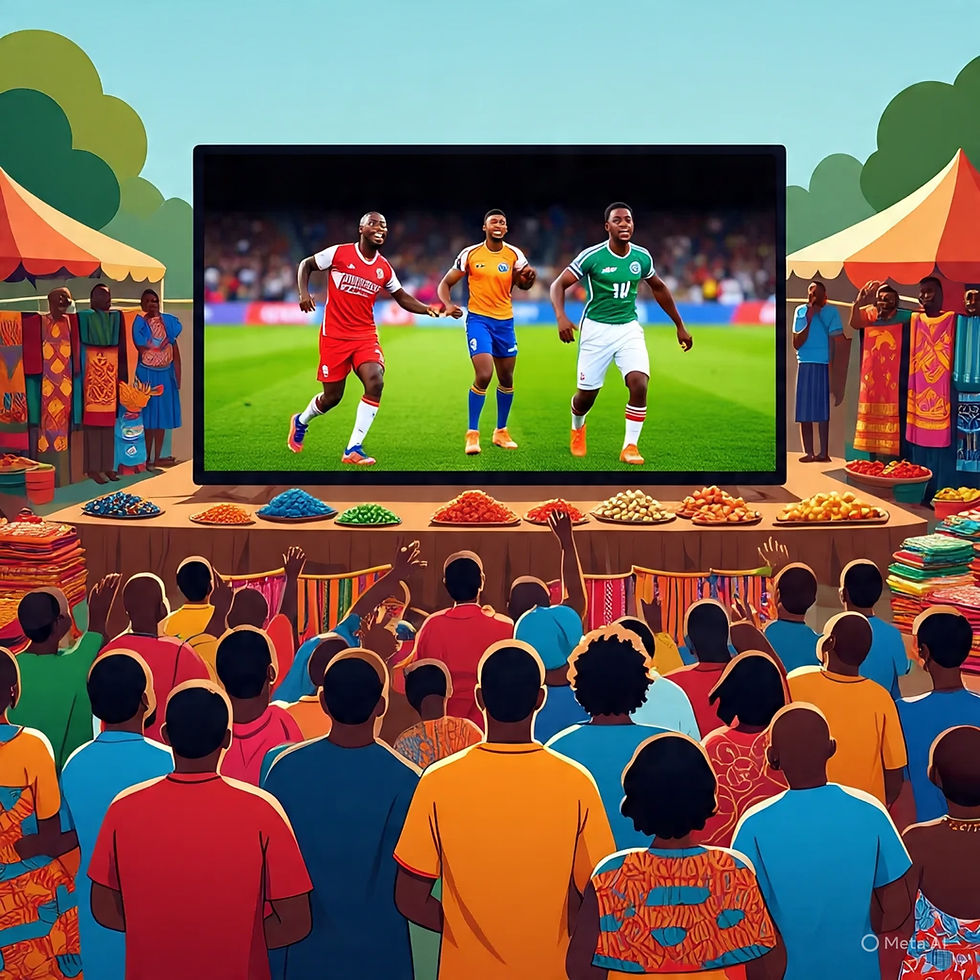Ghana-Nigeria Rivalry: A Tale of History, Economics, and Regional Dynamics
- orpmarketing
- May 17, 2025
- 6 min read

By Obed Oblitey Otoo
Picture this: two West African giants, Ghana and Nigeria, locked in a spirited rivalry that’s as old as their independence. It’s not just about who makes the spiciest jollof rice (though, let’s be honest, that debate could spark a UN summit). The Ghana-Nigeria dynamic is a complex dance of history, economics, and regional influence, with South Africa and Kenya occasionally stepping in to complicate the rhythm. Let’s unpack what fuels this rivalry, explore its economic stakes, and see where the other African powerhouses fit in.
Historical Roots: Colonial Legacies and Independence Struggles
The story begins in the colonial era, when both Ghana (then the Gold Coast) and Nigeria were under British rule. Sharing a common colonial master gave them a shared language—English—and intertwined their fates, but it also sowed seeds of competition. Ghana, under Kwame Nkrumah’s fiery leadership, became the first sub-Saharan African nation to gain independence in 1957. This was a big deal. Nkrumah’s vision of Pan-Africanism and his Convention People’s Party (CPP) inspired anti-colonial movements across the continent, including in Nigeria. But Nigeria, with its larger population and vast resources, wasn’t about to play second fiddle. When it gained independence in 1960, it positioned itself as a regional heavyweight, eager to flex its muscles.
The rivalry took a sharper edge in the post-independence years. Ghana’s early economic success, driven by cocoa exports, gave it a head start. But Nigeria’s discovery of oil in the 1950s and its rise as an oil giant shifted the balance. The two nations began to eye each other warily, each wanting to be West Africa’s leading voice. A pivotal moment came during the Nigerian Civil War (1967–1970), when Ghana’s stance was perceived as lukewarm by some Nigerian leaders, straining diplomatic ties. Meanwhile, migration patterns added fuel to the fire. Nigerians, especially Yoruba traders, had long settled in Ghana, and Ghanaians flocked to Nigeria during its oil boom in the 1970s. But these movements weren’t always smooth—more on that later.
Migration and Trade Tensions: The “Aliens” Debacle
If you want to know where the rivalry got personal, look no further than the mass deportations of the late 20th century. In 1969, Ghana’s government, under Prime Minister Kofi Abrefa Busia, passed the Aliens Compliance Order, expelling hundreds of thousands of undocumented immigrants—mostly Nigerians. The move was driven by economic pressures and rising nationalism, as Ghanaians blamed foreigners for job competition. Nigerians, many of whom had built lives in Ghana, were forced to leave, often with little notice. The resentment lingered.
Fast forward to 1983, and Nigeria returned the favor. Facing its own economic downturn and drought in Ghana, Nigeria deported up to a million Ghanaians and other West Africans. The infamous “Ghana Must Go” bags—cheap, checkered sacks used by deportees—became a symbol of this bitter chapter. These reciprocal expulsions weren’t just about economics; they were about pride, identity, and proving who called the shots in West Africa. Posts on X have echoed this sentiment, with some users framing Ghana’s 1969 move as a reaction to Nigerians’ growing prosperity, while others call Nigeria’s response xenophobic. The truth? It’s messy, rooted in both economic survival and national ego.
Trade disputes have kept the fire burning. In 2019, Ghana’s restrictions on foreign traders, particularly Nigerians, sparked another diplomatic row. Nigeria’s border closures that same year, aimed at boosting local production, hurt Ghanaian businesses, prompting accusations of economic sabotage. The Economic Community of West African States (ECOWAS), meant to foster unity, has often struggled to mediate these spats, especially when both nations flex their regional clout.
Cultural and Sporting Showdowns: Jollof Wars and Football Feuds
Let’s lighten things up for a second—because this rivalry isn’t just about politics and economics. It’s also about culture, and nothing captures that better than the jollof rice debate. Nigerians swear by their tomato-heavy, peppery version. Ghanaians counter with their smoky, spice-layered take. Social media erupts regularly with memes and polls, and even celebrities weigh in. It’s playful, sure, but it’s also a microcosm of the broader competition—who defines West African identity?
Then there’s football. Ghana and Nigeria have faced off 56 times, with Ghana leading 25 wins to Nigeria’s 12. These matches aren’t just games; they’re national pride on steroids. When Ghana’s Black Stars beat Nigeria’s Super Eagles, or vice versa, it’s front-page news. The 2022 World Cup qualifier, where Ghana edged out Nigeria, had fans trash-talking for months. This cultural rivalry keeps the Ghana-Nigeria dynamic alive in the public imagination, even when diplomats are shaking hands.
Economic Significance: Giants of West Africa
Economically, Ghana and Nigeria are West Africa’s powerhouses, but their trajectories differ. Nigeria’s economy, with a GDP of over $400 billion, dwarfs Ghana’s (around $70 billion). Oil is Nigeria’s lifeblood, accounting for much of its export revenue, alongside telecom and banking. Ghana, meanwhile, relies on cocoa, gold, and oil, with a more diversified base. Both nations are key players in the African Continental Free Trade Area (AfCFTA), aiming to boost intra-African trade, but their rivalry can hinder cooperation.
The stakes are high. Nigeria’s population (over 200 million) and market size give it an edge, but Ghana’s stability and higher standard of living—cleaner cities, lower crime—make it a model for governance. The World Bank notes Ghana’s progress in halving poverty since the 1990s, though it faces debt challenges. Nigeria, despite its wealth, grapples with poverty affecting 38.9% of its population and insecurity in the north. Both nations need each other’s markets—Nigeria’s banks dominate in Ghana, and Ghanaian goods flow into Nigeria—but trade barriers and protectionism often get in the way.
The economic rivalry also shapes their influence in ECOWAS. Nigeria’s size gives it leverage, but Ghana’s diplomatic finesse (hosting the AfCFTA secretariat) keeps it relevant. Their competition for foreign investment is fierce, with both nations vying for tech and infrastructure deals. Yet, their economic interdependence means a win for one can benefit the other—if they can get past the posturing.
Challenges: From Debt to Insecurity
Both countries face steep challenges that fuel their rivalry while demanding cooperation. Ghana’s public debt, exacerbated by external shocks, threatens its growth, with poverty projected to rise to 51.2% by 2027. Nigeria’s fiscal deficits, driven by oil dependency and subsidies, limit its ability to address poverty and insecurity. Banditry in Nigeria’s northwest and separatist tensions in the southeast spill over into regional stability, affecting trade routes Ghana relies on.
Environmental degradation is another shared hurdle. Ghana loses $6.3 billion annually to pollution and resource depletion, while Nigeria’s oil-rich Niger Delta faces ecological ruin. Climate change, with floods and erosion hitting both nations, adds urgency to their need for joint solutions. But rivalry often trumps collaboration—Ghana’s push for sustainable cocoa contrasts with Nigeria’s focus on oil, creating divergent priorities.
Enter South Africa and Kenya: The Continental Context
So, where do South Africa and Kenya fit in? Think of them as Africa’s other heavyweights, occasionally stealing the spotlight. South Africa, with its post-apartheid glow and economic might, challenges Nigeria’s claim as “the giant of Africa.” Its good governance and diversified economy make it a continental leader, but its rivalry with Nigeria is more about influence than direct conflict. A 2021 study noted that Nigeria and South Africa’s roles in Africa are driven by realist ambitions—each wants to lead the continent’s path to prosperity. Yet, their competition can weaken the African Union’s unity, as seen in debates over UN Security Council seats.
Kenya, East Africa’s darling, complicates things further. Its tech hub status (think Nairobi’s Silicon Savannah) and robust digital policies put it ahead of both Ghana and Nigeria in innovation. Kenya’s multistakeholder approach to tech governance, as highlighted by the Atlantic Council, contrasts with Nigeria’s top-down style and Ghana’s slower digitalization. Kenya’s football rivalry with Nigeria (less intense than Ghana’s) and its cultural exports, like Benga music, add a soft power dimension. But Kenya’s smaller economy limits its clout compared to the West African duo.
South Africa and Kenya also play diplomatic roles. South Africa’s leadership in the AU and Kenya’s peacekeeping efforts in Somalia give them moral authority, sometimes overshadowing Ghana and Nigeria’s regional focus. During trade disputes, both nations have mediated indirectly through AU or ECOWAS frameworks, though their own ambitions can muddy the waters.
Looking Ahead: Rivalry or Partnership?
The Ghana-Nigeria rivalry is a double-edged sword. It drives innovation, cultural vibrancy, and economic ambition, but it also breeds mistrust and inefficiency. For West Africa to thrive, these giants need to lean into partnership—joint trade policies, shared climate strategies, and cultural exchanges that celebrate both jollof recipes. South Africa and Kenya, as continental players, can nudge them toward cooperation, perhaps by modeling inclusive governance or tech-driven growth.
As a traveler who’s tasted both Ghanaian and Nigerian jollof (I’m staying neutral, folks), I see their rivalry as a sign of vitality. It’s like siblings vying for the top spot at the dinner table—competitive, but rooted in shared history. The challenge is harnessing that energy for collective gain. If Ghana and Nigeria can align their strengths, with South Africa and Kenya cheering from the sidelines, West Africa might just lead the continent into a new era of prosperity. Until then, let’s keep debating jollof and cheering for the Black Stars and Super Eagles.
Sources:
World Bank: Ghana and Nigeria Overviews
Ghana-Nigeria Relations, Wikipedia
Atlantic Council: Emerging Technology Policies
Hegemonic Rivalry in Africa
Posts on X discussing historical deportations




Comments